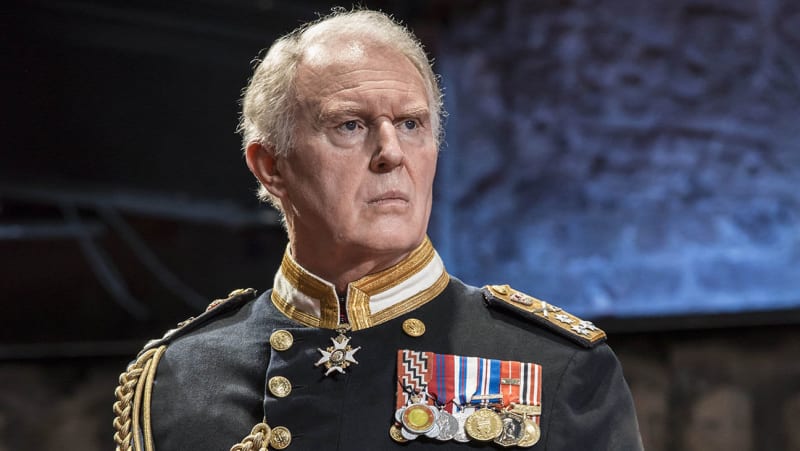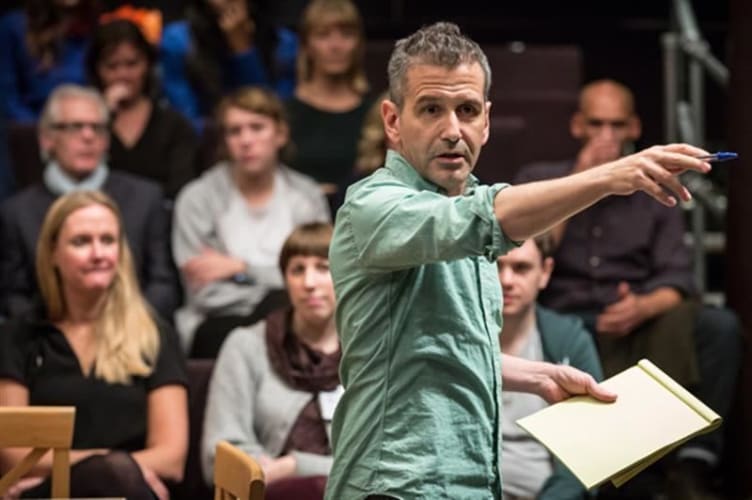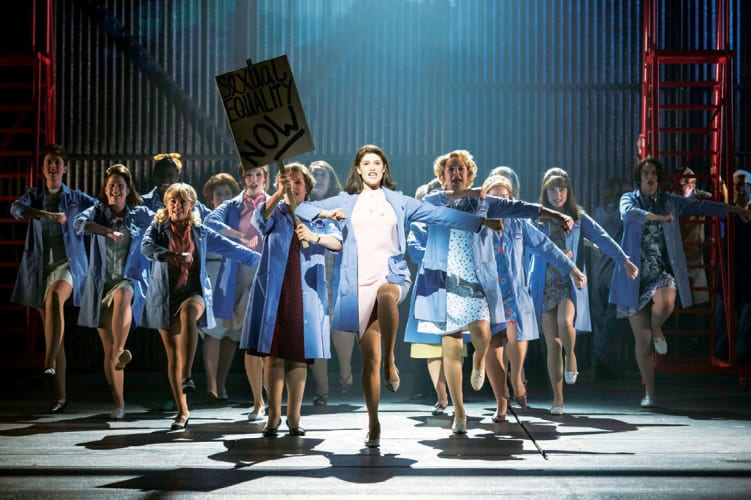Smaller Theatres
It does seem that many of the best smaller theatres are now located in West London. Each is gradually taking on its own character.
The Bush at Shepherd’s Bush has a long tradition of presenting new writing and continues to do so, although financial constraints cannot be helping.
In Albion, Chris Thompson has written a play which builds its chilling stories of racial intolerancer and clubbing around karaoke music.
Robin Soans’s Perseverance Drive was a departure for this Verbatim Theatre specialist. This was a deceptively subtle play dressed up as a raucous comedy about a dysfunctional British family with Caribbean roots. The drama took place both on sun-kissed Barbados and in the rain-drenched UK.
Soans also starred opposite Linda Bassett in Barney Norris’s beautiful debut play Visitors. This piece about the difficulties of ageing appeared early in the year at the Arcola and returned to great acclaim at the Bush.
Ciphers by Dawn King is a spy thriller owing something of its inspiration to Sir David Hare. It follows Gráinne Keenan's Justine as she attempted to protect her country and find love at almost the same time, with disastrous consequences.
Incognito by the prolific Nick Payne spins seemingly unconnected stories across three eras, eventually linking them up. As such, it was a challenging but rewarding play that further enhanced the reputation of an already well-regarded writer.
Christopher Haydon at the Gate, Notting Hill seems to making a concerted effort to present off-beat and avant-garde work.
His programme included the intriguingly named I’d Rather Goya Robbed Me of My Sleep than Some Other Arsehole by Rodrigo García, translated by William Gregory.
This was almost a monologue delivered by Steffan Rhodri but he did have the company of a couple of pigs to make a somewhat bizarre tale even more so.
Idomeneus by Roland Schimmelpfennig, translated by David Tushingham, had an equally odd staging, in and around a very shallow paddling pool. There, a Greek tragedy was related in a modern idiom.
Adam Rapp’s The Edge of Our Bodies was a simple solo that showcased the varied talents of Shannon Tarbet. She plays a schoolgirl who goes on a strange but compelling road trip to New York that might all be a dream.
In Earls Court, the Finborough has been going from strength to strength under Neil McPherson. It manages a sensible mix of discoveries of forgotten plays and new works. This is partly facilitated by a general policy of playing separate pieces on Sunday and Monday evenings to those for the rest of the week, as well as holding new writing festivals.
This Was a Man is principally of interest because of the name the unknown young playwright who wrote it, Noël Coward. Strangely, given his future fame, the 2014 production was the UK professional première of an amusing tale of love and adultery.
It sometimes seems that wherever Coward goes Rattigan follows or vice versa. At the Finborough this year, he was represented by Variations on a Theme. This modern reworking of Dumas's La Dame aux Camélias starred Rachael Stirling as a doomed Grande Dame.
Thérèse Raquin, based on the novel by Émile Zola, fell somewhere between a chamber musical and a small-scale opera. Not only did it entertain musically but Nona Shepphard’s adaptation caught much of the passion and desperation of the original.
During the heady period where it appeared possible that Scotland might leave the United Kingdom, the theatre ran a short season of relevant plays including Robert McLellan’s The Flouers o'Edinburgh. Written in 1948, the piece harked back to the days of revolution in the mid-18th-century.
By comparison, John Ferguson by St John Ervine was relatively modern, coming in at only 135 years of age. In this case, the history was that of Ireland, inevitably riven by rebellion and religion, and a small cross-section of its people.
Northern Ireland was represented by Stewart Parker’s Spokesong. While the play tangentially addressed the Troubles, it could more easily be viewed as a charming romantic comedy set in a bicycle shop, with history repeating itself as the path of true love got tangled up more than once.
To prove itself truly international, the theatre also featured plays from or set in more distant lands.
Obama-ology by Aurin Squire is a little gem of a political play that follows the Obama campaign trail in 2008 from the perspective of one ambitious young man in East Cleveland. It also introduced a star of the future in Katherine Newman.
The Orange Tree in Richmond saw one of the year’s biggest changes when Sam Walters retired as artistic director of the more than 40 years in the role. Before he left, the theatre produced School for Scheming, a delightful melodrama by that Irish specialist of the genre, Dion Boucicault directed by Walters’s wife Auriol Smith.
It also saw the return of Australian playwright Stephen Sewell with It Just Stopped, a play that starts out in his native Australia but unerringly attacks the capitalism of The Great American Dream.
George Bernard Shaw wrote so many plays that it is still possible to see many for the first time. Widowers' Houses has been performed in London in living memory but under new artistic director Paul Miller, it showed the playwright in his formative years testing out the kind of material that eventually led to Major Barbara.
Eve Leigh’s Silent Planet managed to seem old-fashioned even though its subject matter was relatively modern. The action took place in a Siberian Gulag where an intellectual suffered for his beliefs in a fashion regularly seen in samizdat literature a generation ago.
The Menier Chocolate Factory ended the year on a high with an intoxicating and sometimes suffocating new production of Assassins by Stephen Sondheim. A large cast under the very busy Jamie Lloyd featured Catherine Tate, Jamie Parker and Mike McShane in a homage to those that attempted to murder American presidents—and sometimes even succeeded.
A trip to the Elephant and Castle to visit the latest home of Southwark Playhouse generally resulted in a good night out. A small selection of work across their two houses includes the following.
Without wishing to denigrate the theatre, it was something of a surprise that it managed to present the British première of Superior Donuts by Tracy Letts. This is a play by one of America’s best living playwrights that ran on Broadway a few years back.
It features the life of a quirky loner running the eponymous cafe and a young man who he hires to help out with unexpected consequences.
The year ended in the Little Theatre with The Dragon by Yevgeny Schwartz in a new version by Daniel Goldman for Tangram.
This combined modern slapstick with a very serious parable about Stalinist Russia seen through the eyes of a village that is threatened by a dragon and, as soon as it is seen off by their very own Sir Lancelot, something worse.
In central London, Jermyn Street has really gone from strength to strength under Antony Biggs, occupying similar territory to the Finborough and The Orange Tree by reviving long lost classics and discovering new writers.
It also has the knack of attracting top-class actors and directors along with young aspirants.
Statements After an Arrest Under the Immorality Act by Athol Fugard is a truly terrifying and powerful three-hander that is an uncomfortable reminder of the horrors of apartheid.
Under the direction of Cordelia Monsey, David Judge and particularly Jasmine Hyde gave raw, deeply moving performances as the protagonists in a fatal affair.
Natural Affection provided a rare opportunity for Londoners to see a play by American writer William Inge. Lysette Anthony starred as a woman attempting to deny her age by taking up with a younger man. The arrival of her son only complicated matters.
Flowers of the Forest is an anti-war play by John van Druten set in 1934 but flashing back to World War I.
Sophie Ward took the central role in a work where drama sometimes yielded second place to the playwright’s ideas.
The ever more popular Terence Rattigan co-wrote First Episode as a very young man with Philip Heimann, who went on to greater things but not in the theatre. It features a series of bright young things having fun at University. Sadly, this only very briefly extends to an infatuated actress of a certain age portrayed by Caroline Langrishe.
Not too far away, Soho Theatre often concentrates on comedy but does welcome some special theatrical events as well, especially in the smaller upstairs space.
Jezebel was a hilarious and often touching new comedy from Ireland by Martin Cantan that explores the difficulties of dating in the 21st century. Lynne Parker’s production for Rough Magic featured Peter Daly and Margaret McAuliffe as a couple whose life is never quite the same after they meet Valerie O’Connor in the title role.
The One brought back the award-winning combination behind Fleabag. This time, Phoebe Waller-Bridge stars while Vicky Jones transforms into a playwright to create an off-beat love story with lashings of sex.
Smallholding by Chris Dunkley is a quirky comedy set in the countryside featuring a man suffering from the terrors of unemployment and his generally supportive partner, respectively played by Chris New and Matti Houghton.
The Park in Finsbury Park is one of the new kids on the block but is beginning to find its feet. This year, the undoubted highlight was the first revival of Richard Bean’s Toast, a hilarious black comedy set in a bread factory in the North.
The 90-seat space tends to be more experimental and did well to attract Chicken Shop by Anna Jordan, one of a whole string of budding young playwrights who look set to make the grade. Seen through the eyes of a youngster struggling to come to terms with himself and adult life, it shines a spotlight on the Eastern European trade in slavery and prostitution that has grown up in London.
The King’s Head found itself home to Autobahn, a series of short plays by Neil Labute. With actors swapping roles and much food for thought as the playwright dissects The Great American Dream, this proved to be a very enjoyable evening.
The Tabard is a small, somewhat cramped venue but welcomed an excellent production of George Bernard Shaw’s Misalliance. This might be a rather lightweight comedy but it richly deserved this revival and surely must be seen in London again before too long.
A new festival in the Vault underneath the arches at Waterloo provided some of the least comfortable facilities of the year. There was a wide variety of theatre on show including stage adaptations of Ian McEwan’s The Cement Garden and Dr Hunter S Thompson’s Fear and Loathing in Las Vegas.
There was also a first outing for Symphony written by the talented trio of Ella Hickson, Nick Payne and Tom Wells. This combination of rock music and micro theatre then popped up in various locations for the rest of the year.
The touring circuit quite often stops just outside London at either Watford or Richmond. Those wishing to see some of the best that companies like Paines Plough have to offer therefore find themselves trekking to the end of the relevant tube line. In 2014, their rewards were rich, although some of the plays eventually booked London transfers.
One of those is The Angry Brigade by James Graham at the Watford Palace. Those with long memories will recall a group of British anarchists who briefly caused mayhem in the 1970s and now find themselves memorialised on stage. This play of two halves doesn’t quite knit as the comic police procedural of the first half gives way to what might well be a faithful portrait of life on the other side of the law, when you don’t believe in the politics or even continued existence of contemporary society.
An Intervention by Mike Bartlett was a two-hander starring Rachael Stirling and John Hollingworth commencing with the cradle of their relationship and seeing it right through to the grave. Along the way, they manage to make some wry observations about Desert Storm and 21st-century living.
In Richmond, Catch 22 directed by Rachel Chavkin of New Yorkers The TEAM for Northern Stage brings Joseph Heller’s iconic novel to the stage in reasonably effective, if somewhat long-winded fashion.
The busy Anya Reiss seemed like the perfect person to bring Frank Wedekind’s Spring Awakening up-to-date. Her lively new version for Headlong received some rave reviews and was worth a look without ever attaining perfection.


